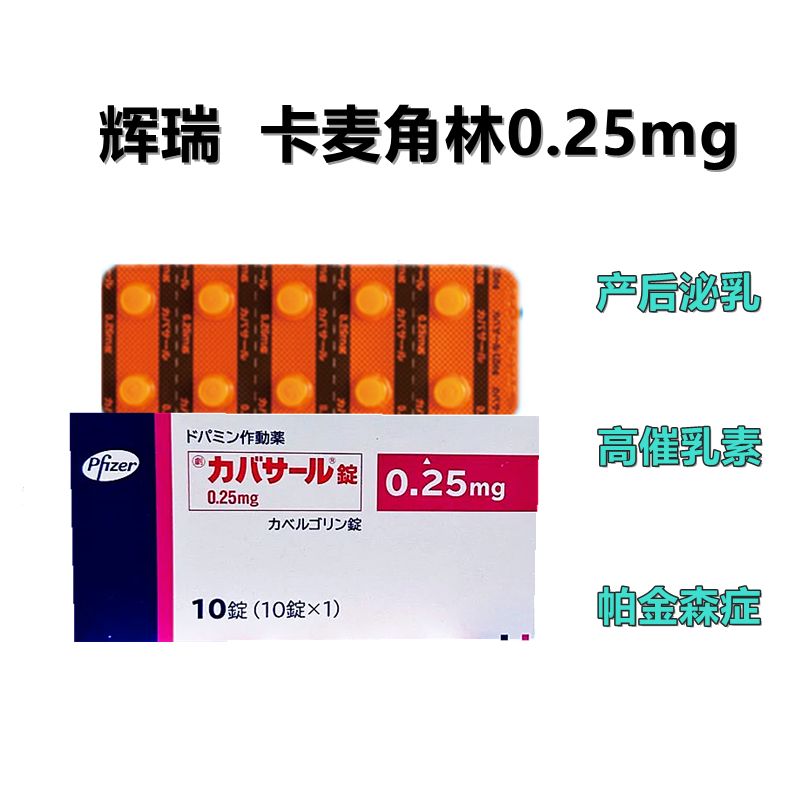
Generic Name: Cabergoline
Brand Name: Dostinex
Indications:
Treatment of Parkinson's disease.
Treatment of hyperprolactinemia (high prolactin levels).
Investigational use in breast cancer.
Dosage and Administration:
For Hyperprolactinemia in Adults:
Initial dose: 0.25 mg orally twice a week.
Dose adjustment: May increase by increments of 0.25 mg twice weekly based on serum prolactin levels. Interval between dose adjustments should be no less than 4 weeks.
Maximum dose: 1 mg twice weekly.
Mechanism of Action:
Cabergoline is an ergot derivative with potent, long-acting, and selective dopamine receptor agonist activity, particularly with high affinity for D2 receptors. It reduces prolactin secretion by stimulating dopamine receptors, and a single dose can suppress prolactin for up to two weeks. It has investigational use in breast cancer treatment.
In Parkinson’s disease, it is used as monotherapy in early stages to delay levodopa use, or as adjunct therapy when levodopa becomes less effective or poorly tolerated. Combined with levodopa, it can improve the "off" phases of the "on-off" phenomenon. Daily dosing improves UPDRS motor scores, enhances quality of life, and can reduce levodopa requirements by approximately 18%.
Adverse Reactions:
Early-stage reactions may include nausea, vomiting, dizziness, orthostatic hypotension, and syncope.
May cause peripheral vasospasm, nasal congestion, erythromelalgia, arrhythmias, exacerbation of angina, dry mouth, constipation, diarrhea, headache, and drowsiness.
Parkinson’s patients may experience motor complications; patients with acromegaly may develop gastrointestinal bleeding.
Long-term use can cause livedo reticularis (mottled skin), peritoneal fibrosis, pleural thickening, and effusion.
Precautions:
Pregnancy: Discontinue once pregnancy is confirmed unless treating a pituitary prolactinoma, where therapy may continue to prevent tumor growth.
Teratogenicity: Long-term studies show no increase in fetal malformations.
Elderly: More prone to CNS side effects—use with caution.
Monitoring Required:
Patients with hyperprolactinemia should have imaging (X-ray, CT, or MRI) to rule out pituitary adenomas before treatment. Follow-up annually if a tumor is present.
Monitor blood pressure postpartum when used to suppress lactation due to risk of hypotension.
For amenorrhea, perform pregnancy tests regularly, especially if menstruation resumes and then ceases.
In infertility treatment: monitor basal body temperature, serum FSH/LH, urinary estrogens, and progesterone metabolites; also monitor prolactin levels. For men, test testosterone every 3–6 months and assess sperm count and motility after 3 months.
In acromegaly: monitor serum GH and/or IGF-1 and clinical symptoms.
High doses may reduce saliva secretion, increasing risk of dental caries, periodontitis, and oral candidiasis.
Take with food or after meals to reduce gastrointestinal side effects.
Use non-hormonal contraceptives during treatment. If pregnancy is suspected, stop the drug and consult a physician.
Do not use within 4 hours postpartum; ensure vital signs are stable before administration.
Reduce dosage in patients with hepatic impairment.
Rule out pituitary tumors before treating infertility.
Short-term use is recommended for amenorrhea or galactorrhea; prolonged use is not advised.
Use caution in patients with:
Suprasellar extension of pituitary tumors with visual impairment
Pregnancy or potential pregnancy
Liver dysfunction
Peptic ulcers or history of GI bleeding
Psychiatric disorders or history thereof
Co-administration with levodopa may enhance efficacy; reduce levodopa dose by 12.5% if using 10 mg/day.
May restore normal ovulatory function; contraception is recommended during treatment.
May cause hypotension at initiation; caution when operating machinery or driving.
Adverse effects are dose-dependent and vary among individuals; most resolve after dose reduction or discontinuation—close monitoring is essential.
Alcohol increases sensitivity to ethanol and worsens GI side effects; avoid alcohol during treatment.
Contraindications:
Allergy to ergot derivatives.
Severe ischemic heart disease or peripheral vascular disease.
Children under 15 years of age.
Pregnant or breastfeeding women.
History of severe psychiatric disorders.
Hypertension or history of gestational hypertension/preeclampsia.
Acromegaly patients with peptic ulcers or bleeding history.
Storage:
Store at controlled room temperature (20–25°C / 68–77°F).
